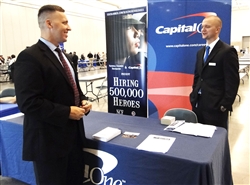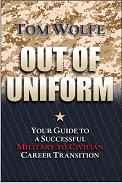|
|
||||
|
|
|||||
|
Click here for a complete list and description of organizations of TAOnline.com growing Partners! |
|
Social Media can be a covert and overt tool as you move from military to civilian life. Join our partner – Lida Citroën, August 23 @ 11am EDT for a free webinar on making the most of Social Media and Networking. To apply online - visit Free Webinar Registration. |
CamaraderieSeveral years ago one of my clients asked me if he should expect the same level of camaraderie in a civilian job as he had in the military.
My answer was no, and yes. There is nothing in the civilian workforce that can approximate the bonding that occurs in the wardroom, ready room, or foxhole. Military personnel in those environments put up with much hardship – long hours, stressful working conditions, danger to personal safety, separation from loved ones, and more. However, because they are all in it together, they get through it. This mutual self-sacrifice, teamwork, and covering each other's six contribute to individual bonding, unit cohesion, and, ultimately, the camaraderie in question. Other than perhaps the professions of law enforcement, fire fighting, and emergency medicine (notice the common denominator), it would be difficult to find a civilian occupation that approximates the conditions of the foxhole. It follows therefore that finding the military version of camaraderie in a civilian occupation is almost impossible. Some people do get close however and often it is simply a matter of time. "Hail and Farewell Parties," the Welcome Wagon, personal sponsors, turnover period, contact reliefs—these are examples of the military's effort to ease the transition from one duty station to another. Because of the high frequency of duty station rotation in the service, it is important that the system accommodates these transitions. Getting onboard and up-to-speed quickly contributes to the automatic "welcome to the club" experience that awaits most military personnel when they report to a new duty station. This contributes to the camaraderie of military service. Civilians do not do it that way. Many military-to-civilian career changers will tell you that although they did not find the camaraderie and esprit de corps initially in their civilian jobs, it did start to develop in the first 12 to 18 months of employment. This delay is due in part to the fact that unlike in the military where you are quickly welcomed "to the club," in the civilian sector you have to earn this membership over time. You might also have to take the initiative. Do not expect the Welcome Wagon to pull up in front of your house the first week on the job (if ever) nor should you line up a baby sitter in anticipation of your "Welcome Aboard" party. Those things or their equivalents will come, but it takes time. The kind of people with whom you work and the corporate culture of the organization will influence the feeling of camaraderie. Take a look at the people in those military foxholes. They share much in the way of values, ethics, commitment, sacrifice, reliability, citizenship, and courage. Can the same be said of the civilian workplace? Maybe yes, maybe no. Is there a lesson here? How about this. As you transition from the military to civilian sector and as you appraise opportunities and offers, in addition to things like money, location, benefits, growth potential, and job satisfaction, perhaps there is one more issue to consider—are these my kind of people? © 2012; Tom Wolfe, author; all rights reserved; excerpts from Out of Uniform: Your Guide to a Successful Military-to-Civilian Career Transition; used with the permission of the author and publisher, www.potomacbooksinc.com. Tom Wolfe is an author, columnist, career coach, veteran, and an expert in the field of military-to-civilian career transition. During his career he assisted thousands of service members in their searches for employment, placing more than 3000 in their new jobs. Prior to civilian life, he graduated from the U. S. Naval Academy and served as a surface warfare officer. He teaches transition courses, gives seminars on career and job change, writes about the career transition process, and continues to counsel current and former military personnel. His book, Out of Uniform: Your Guide to a Successful Military-to-Civilian Career Transition, was published by Potomac Books in 2011. Tom lives on the North Carolina coast with his wife, Julie, and their Chesapeake Bay retriever, Maggie. |
Employers Court Troops, Spouses, Vets at Job FairsBy Lisa Daniel HAMPTON, Va., Aug. 6, 2012 – Transitioning service members, military spouses and veterans attending hundreds of job fairs around the country, are finding themselves on the proverbial red carpet as employers pack arenas to add those closest to the armed forces to their payrolls. At such a fair earlier this month in Hampton, VA, Job seekers maintained long lines at the booths of employers in industries long known to hire veterans, such as law enforcement and defense contractors, as well as some less traditional career paths, such as finance. Find an upcoming Career Fair Navy Seaman Terrance Cartlidge was among the service members who waited in line to speak with prospective employers about his post-military options. After nearly four years in the Navy, Cartlidge, 24, hopes to land a good job and go to college after he separates in November. "I know we're still in a recession, but this is exciting that people are wanting to hire right now," he said. "I'm feeling pretty good about it." Andrea Hall accepted resumes and spoke with many prospective employees for her company, CSC, which counts 25 percent of its workforce as veterans or military spouses. CSC hired 1,800 spouses and veterans last year, with more than 600 of those having a disability, she said. "You hear about the good will of employers [in hiring veterans and spouses], but this really speaks to our bottom line," Hall said. "We want to put people who are comfortable with that environment, who speak the language of the military, who have or can get a security clearance" to work on defense contracts. Like many recruiters focused on hiring from the military community, Hall understands it well because it was her world, too. She was an Army wife for 21 years until her husband retired last year. After years of trying to juggle a career through frequent moves, she settled into her current job in 2005 after working for the Army Spouse Employment Program. Today, Hall said, she is happy to help spouses, transitioning service members, wounded warriors, and their caregivers get – and maintain – CSC jobs. "We have some spouses who have been here for years," she said, noting that the company tries to place them in new jobs throughout their relocations. "We advocate on their behalf," she said. Military-related job seekers may also find support outside of defense-related jobs. 
Thomas Haydon and Derrick Beggs, both recently separated from Army infantry divisions, were manning the Capitol One booth here as representatives of the banking giant's military recruiting division. The two rattled off numerous cities they have been to or will visit in the coming weeks in an effort to grow the bank's ranks of those with military-related experience. "We're growing, so we're going all over the place" as Capitol One looks to fill 3,600 positions in the next year, Haydon said. Some of those jobs, such as loan coordinators, require no financial experience – but do require three years in the military, he said. "It's because of their skills, their abilities, ...the duty, honor, and respect," Beggs said of the targeted military hiring. Destiny Ashlock, a district leader for Primerica Financial Services, said her company also works to hire and keep military spouses by networking to transfer them as they move from state to state. Primerica's regional leader here, retired Army Lt. Col. Daniel Roose, is committed to hiring from the military community, she said. "We want employees who are motivated, trainable and who like helping people," Ashlock said. It's because of the recession, and not in spite of it, Ashlock said, that Primerica is increasing hiring of people who can teach others to manage their money. |
Boot Camp for Veterans Seeking Employment in MedTech IndustryProgram offers job-search assistance and mentoring The MedTech Veterans Program (MVP) Boot Camp recognizes the strong correlation behind the mission of the medical technology industry and that of veterans who have transitioned from service in the military to an interest in serving patients and caregivers. The program applies to all military veterans, with special recognition of those wounded overseas. 
"The origin of this program came from shared frustration among veterans in finding internships or job placement following military service," said Abiomed Chairman, President and CEO Michael Minogue, a veteran himself, who helped establish the MVP Boot Camp for Returning Heroes after speaking with discouraged wounded veterans. "This program demonstrates the industry's collaboration and commitment to providing the tools necessary for these veterans to pursue successful roles in the medical technology field and continuing to serve a mission to help patients." The MVP Boot Camp will select and invite up to 25 candidates in this first year, who will receive job-search assistance and advice about careers and networking in the medical technology industry. The three-day program, in conjunction with AdvaMed 2012: The MedTech Conference in Boston in October 1-2, kicks off with a welcome reception and dinner, followed by two days of educational programming, networking opportunities and mentorship. Each MVP Hero will partner one-on-one with an industry mentor serving as a personal career guide in training sessions and at AdvaMed events. These mentors are military veterans who have made successful transitions into medtech careers and will offer first-hand insight and ongoing personal assistance. "Right now, we have more mentors than we have candidates", said Ashley McMaster, Director of Communications for AdvaMed. "These opportunities aren't limited to officers. We invite and encourage all interested parties to apply". "The medical devices industry already plays an important role in developing innovative products for the military and its veterans. Creating a program that helps train and mentor veterans who may be interested in a career in medical technology is a laudable extension of this industry's efforts," said Jeffrey Shuren, M.D., director of FDA's Center for Devices and Radiological Health. Expenses for veterans to attend the MVP Boot Camp are supported by contributions from military veterans and other donors. To learn more and apply for this opportunity, take a look at the AdvaMed Convention Website. |
|
TAOnline.com | 51 Mill Street | Bldg E Suite 21 | Hanover, MA 02339 TAO Privacy Statement | View Previous Issues | Military Job Fairs Contact: Webmaster@TAOnline.com ©TAOnline.com 1996-2012, All rights reserved. |

